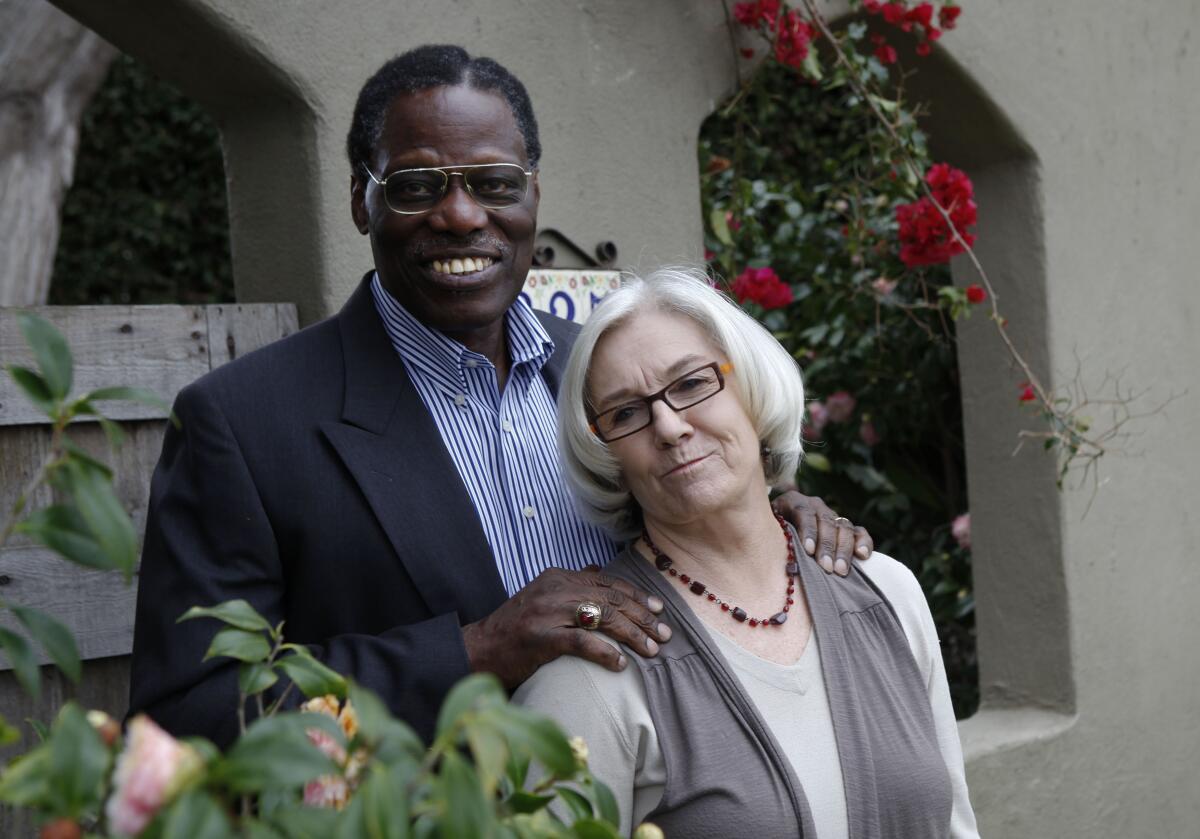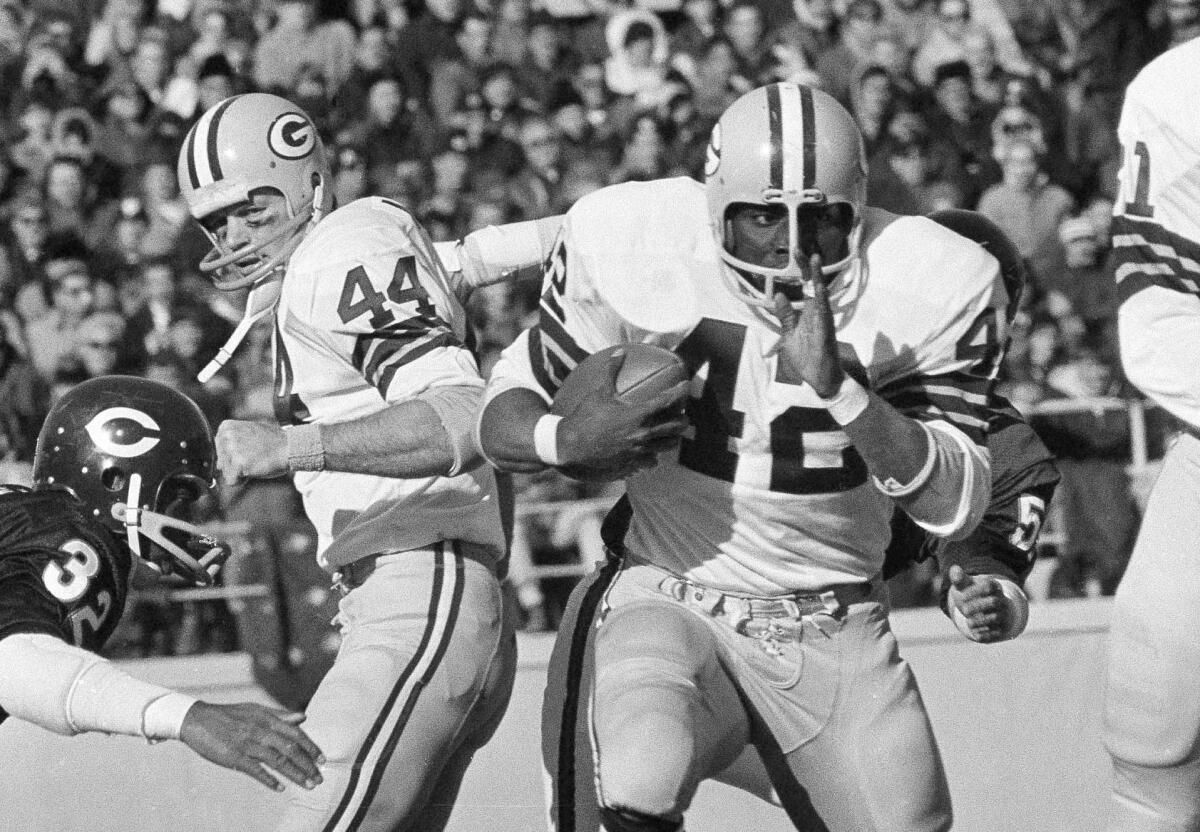John Brockington, football star and organ-donor advocate, dies at 74

After receiving a kidney from a friend who became his wife, he created a foundation in San Diego that encouraged and assisted organ donations.
- Share via
John Brockington believed in providence, that what happened to him — the football career, the illness, the kidney donation that was both a love story and a calling — happened for a reason.
“I believe God had all this planned for me,” he once told the San Diego Union-Tribune.
Brockington, who died Friday at UC San Diego Medical Center at age 74, spent the last 20 years as an advocate for organ donations, traveling the country from his home in San Diego to raise awareness.
He hosted galas, rode in the Rose Parade, was invited to the White House, appeared on ESPN — all because of the second chance he’d been given at life and what he did with it.
“I know what I went through,” he said, “and we’re really trying to ease people’s pain here.”
Born Sept. 7, 1948, Brockington grew up in Brooklyn, N.Y., where his prowess as a football running back attracted a visit by Woody Hayes, the Ohio State coach legendary for his toughness. Brockington was cut from the same cloth, known more for going through defenders than around them.
In college, he helped lead the Buckeyes to an undefeated season and the national championship in 1968. The Green Bay Packers drafted him in the first round in 1971, and he became the first player to rush for more than 1,000 yards in each of his first three NFL seasons.

That success earned him spots in the Pro Bowl three times, including the 1974 game, which held its practices in San Diego. The weather made an impression and, after his final season in 1977, he settled in the city, working in financial investments.
At a deli in Little Italy, he was introduced to a woman, Diane Scott, who taught literature at UC San Diego. She had grown up on the Wisconsin-Illinois border, a fan of the Packers, and of Brockington. She remembered sitting in the stands during a rainy Monday night game against the Detroit Lions in 1971 and admiring his relentlessness in the mud.
They became friends, then a couple, then exes over religious differences. In late 2000, they connected again, after Brockington became so ill he could barely walk or breathe. He hadn’t had a physical in 20 years, and when he finally saw a doctor, the news was grim: His kidneys were failing.
A transplant was needed, and Scott became his donor. The operation, on Nov. 28, 2001, was a success. Brockington and Scott grew close again and a couple of years later were married.
In early 2004, in a Union-Tribune interview, Brockington marveled at the thread that had saved his life and brought the couple together. “What would have happened if I had played for the Chiefs or Giants or 49ers?” he asked.
“If you had been a 49er,” his wife said, “you wouldn’t have received any of my organs.”
They started the John Brockington Foundation, a nonprofit that raised awareness about transplants and assisted donors and recipients with transportation, food, rent money and other needs. Diane Brockington said in an interview Monday that it raised almost $1 million over the years before it curtailed operations because of COVID-19.
In 2015, the Brockingtons appeared in the Rose Parade as part of the Donate Life float, which was titled “The Never-Ending Story.” In 2019, they were invited to the White House for a transplant event but couldn’t attend. They were busy in Wisconsin helping to launch a donor-awareness program.
“John helped put a healthy face on being a kidney recipient,” his wife said. “He showed you can be alive and vibrant after a transplant.”
Most donated kidneys last 15 to 20 years, so the one she gave him beat the odds. And it wasn’t his cause of death, she said.
“He had been getting weaker and it was just a general giving-out” after years of immuno-suppressive drugs, she said.
In addition to his wife, survivors include two siblings, Linda Brockington of Brooklyn and Freeman Brockington (hometown unknown); two daughters, Kelly and Ashley Brockington, both of New York; and two stepdaughters, Jessica Cogan of New Orleans and Justine Gunn of Los Angeles.
Services are pending at New Life Presbyterian Church of La Mesa, where he was a member for 30 years. A celebration of life is also being planned.
More to Read
Sign up for Essential California
The most important California stories and recommendations in your inbox every morning.
You may occasionally receive promotional content from the Los Angeles Times.












